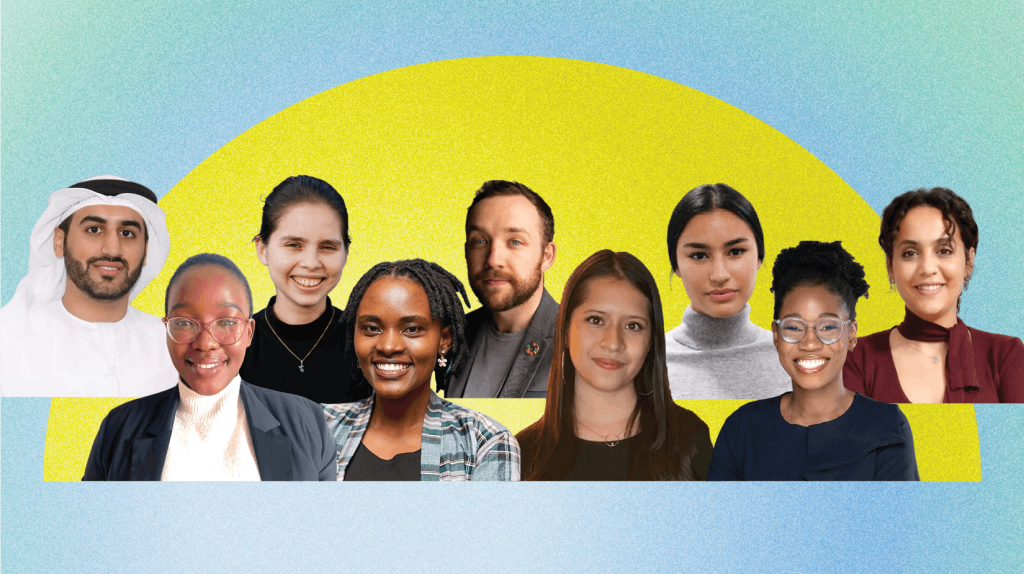
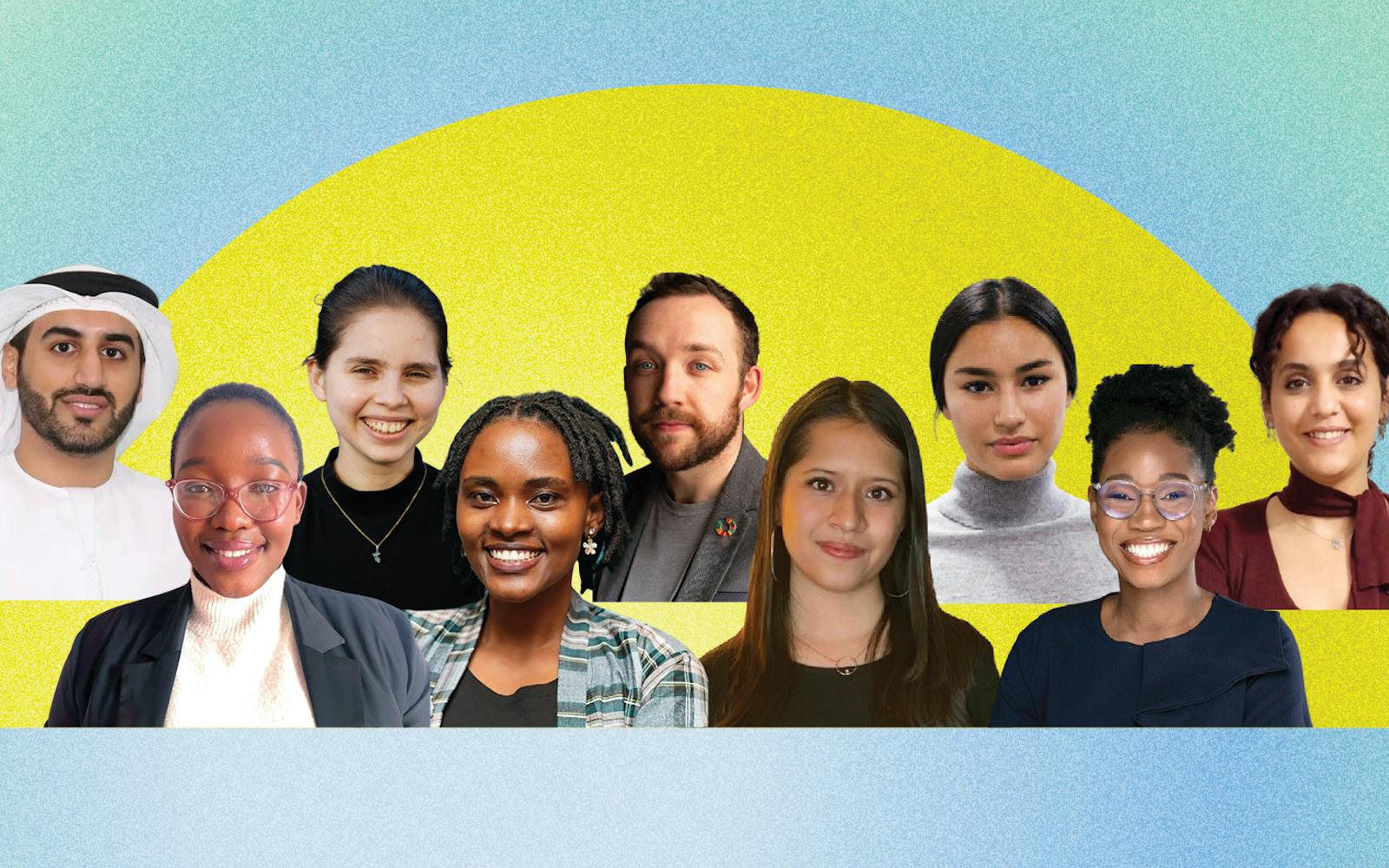
9 youthful leaders from world extensive shared their ideas on bettering the multilateral system for his or her expertise – and for generations to return. again row, left to proper: Butti Almheiri, Inés Yábar, Jacob Ellis, Saru Duckworth, Mai Sami Mohamed Ahmed. entrance row, left to proper: Anita Dywaba, Alice Mukashyaka, Claudette Salinas Leyva, Kelechi Achinonu.
The world is getting youthful: Half of the worldwide inhabitants is underneath 30, and 10 billion people is extra probably to be born earlier than the century ends. We requested 9 youthful leaders how the current multilateral system can work greater for current and future generations — and why it’s crucial that it does so, sooner not later.
youthful individuals will not be solely the leaders of tomorrow, however they’re additionally main right now. they’re the innovators, thinkers, and doers who’re addressing our most pressing world crises whereas difficult the established order at every diploma of vitality. They’re calling for change inside the multilateral system, a system designed over seven many years in the past to foster world cooperation and defend peace, so as that it greater displays our world right now.
they typically’re not alone of their need for change. The UN Secretary-regular has proven he’s dedicated to strengthening the multilateral system to raised signify youthful people right now — and be match to serve for generations to return. At his request, the UN basis convened a bunch of youthful leaders from world extensive — typically referred to as subsequent expertise Fellows — to map out a plan to do precisely that. Now the second cohort of subsequent expertise Fellows is constructing on the recommendations specified by the report, “Our Future Agenda.” These youthful individuals are consultants of their very personal proper, specializing in a unfold of factors — from local climate change to gender equality, training, and jobs — which will have an effect on their lives and completely different people of future generations. They’re working to reshape our multilateral system with, by, and for the youthful people of right now and tomorrow.
5 years after the UN adopted a decision to acknowledge the worldwide Day of Multilateralism and Diplomacy for Peace, we spoke with 9 subsequent expertise Fellows about why the views of youthful individuals are important in any respect decision-making tables, what leaders get flawed about inclusion, and why we will’t afford to surrender hope virtually about implementing the Sustainable enchancment goals (SDGs).
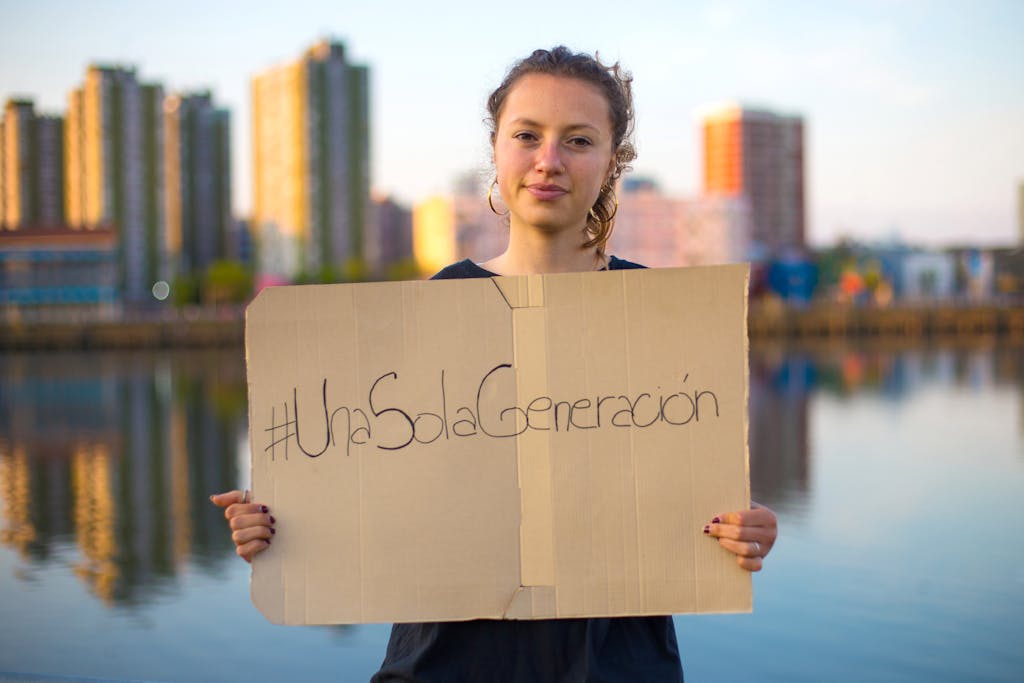
youthful individuals are demanding movement on our most pressing world crises – and difficult the established order at every diploma of vitality. Nineteen-12 months-outdated Nicole Becker mobilized youthful people for local climate movement in her dwelling nation of Argentina after seeing associated protests by youthful Europeans on Instagram. picture: Sebastián x Gil / UNICEF
“Our Future Agenda” opened with a declaration, “it is time to reimagine the United Nations and its position on the earth.” How would you repair the multilateral system to be a platform for the future?
Claudette Salinas Leyva, Mexico, 23 | Fellowship Focus: Future Generations
Our world mustn’t be the identical as a end result of it was when the UN was created over seventy five years in the past. It isn’t 1945. to raised equip the multilateral system for the future, we now want to encourage extra collaboration and partnerships with consultants and stakeholders throughout sectors.
Alice Mukashyaka, Rwanda, 27 | Fellowship Focus: reworking training
Reforms ought to mirror the current world we reside in: the twenty first century. we now want to encourage better participation and illustration. and that i’m talking about better participation by a unfold of voices — from growing international places, civil society organizations, completely different non-state members, and, in any case, youthful people. better illustration of these teams may create a broader, extra participating platform for the future.
Jacob Ellis, Wales, 30 | Fellowship Focus: Future Generations
We should additionally acknowledge that the multilateral system has achieved some good work in promoting and defending the rights and pursuits of future generations. I admire the emphasis on reimagining barely than fixing one factor that is extra probably to be damaged. whereas the system does have areas to increase, i am pretty joyful with what the system has already achieved and that i want us to assemble on that good progress. and finally, we now want to suppose past what has to change and suppose extra about how we’re going to change it. Implementation is important.
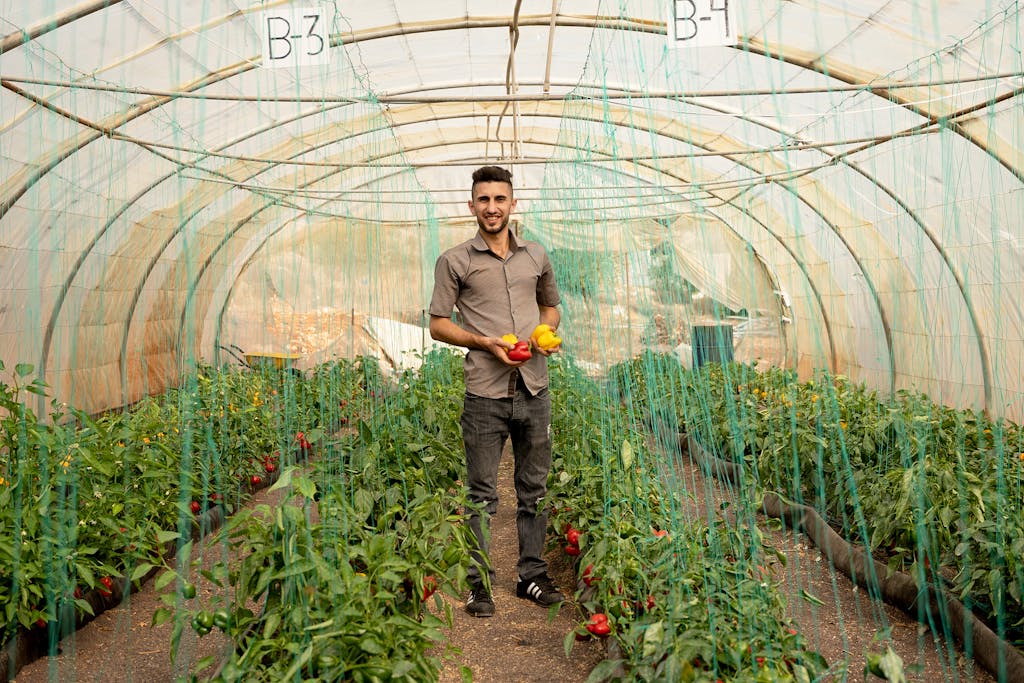
international places are being urged to place money into youthful people and assist them construct expertise which will advance local climate movement. Ahmad grew to become a Youth local climate chief with UNICEF after seeing the impacts of local climate change firsthand on his household’s farm in Jordan. He believes his expertise and generations to return can discover options to local climate change which will make the planet extra livable for all people. picture: Jude Al-Safadi / UNICEF
Why do you suppose it’s important for youthful people to be included throughout the multilateral system?
Anita Dywaba, South Africa, 24 | Fellowship Focus: Gender Equality
you may uncover a method to’t have a system working for future generations and by no means embody these future generations. for that purpose we see a area of curiosity between youthful people and the multilateral system. When youthful individuals will not be adequately included in these multilateral areas, they don’t see the UN’s relevance of their day-to-day lives. And to have the buy-in of the people who discover themselves going to be dwelling inside the tip, that you merely want to incorporate them. you may uncover a method to’t make decisions about youthful people’s lives with out collectively with youthful people. It simply doesn’t make sense.
Inés Yábar, Peru, 27 | subsequent expertise Fellows Lead
It’s not ample to merely embody youthful people. who’re these youthful people? Are they already an ingredient of the “golden circle” — the identical youthful advocates who’re on an everyday basis invited to hitch multilateral areas? We want to be intentional about in search of out youthful people who reside in tougher-to-attain places like shelters, shantytowns, Indigenous territories, or rural and distant communities. It’s about going past our personal networks and luxurious zones, and asking ourselves on daily basis: “Are we doing ample to incorporate completely different people?” And as prolonged as we proceed asking, we’re in all probability heading inside the becoming course.
Mai Sami Mohamed Ahmed, Egypt, Age 28 | Fellowship Focus: little one Rights
Having labored with kids and youthful people inside the sector in disadvantaged circumstances, I understand how they’re primarily the most in a place to expressing their wants and expressing the world they want to reside in. they’re very extremely effective in delivering their messages. They don’t want others to communicate for them. they’re very in a place to talking for themselves and elevating their calls for. we ought to always simply be right here to assist their significant participation in a quantity of worldwide moments with the UN or one other worldwide setting.
Butti Almheiri, United Arab Emirates, 24 | Fellowship Focus: local climate
particularly inside the sector of local climate change, I think about international places should give extra assist to their youth and picture in them. put money into youth and construct their capabilities inside the sector of renewable vitality and local climate factors. as a end result of we understand how and the place the future goes. We want to be ready. And governments can greater equip youth to be these leaders of the future
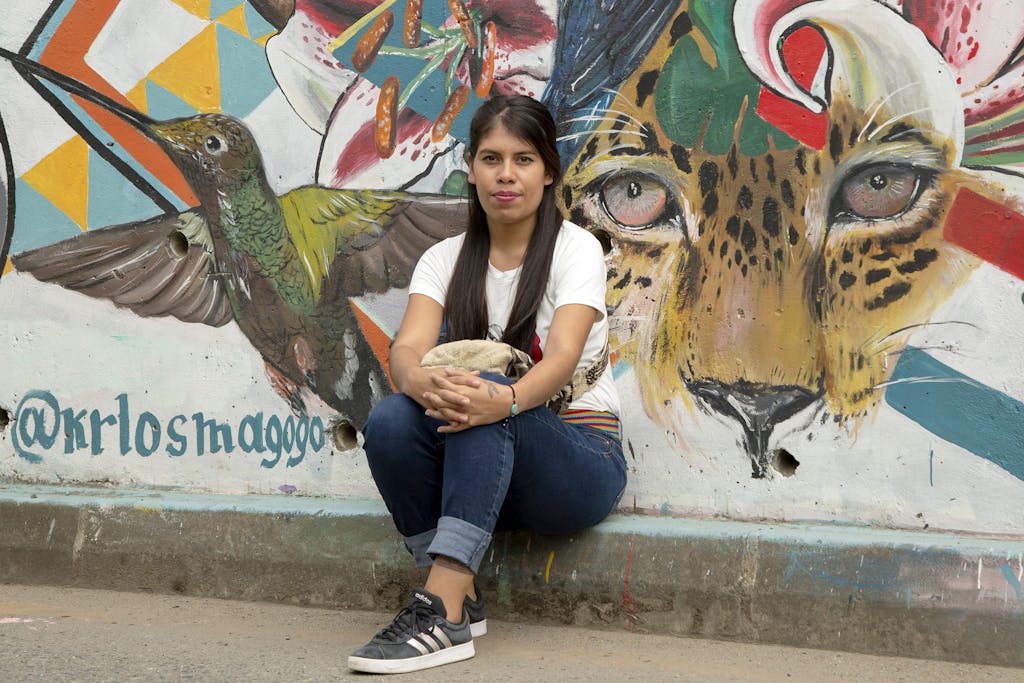
youthful individuals are calling for a extra various group of advocates, who’re main change, to be included in multilateral areas. famend Youth chief of the Indigenous movement, Daniela Soto performs a key position inside the enchancment of peace. She is a 22-12 months-outdated indigenous lady from the Nasa people, a philosophy scholar and a sufferer of the armed battle. picture: Deisy Tellez Giraldo / UN picture
How can our multilateral system greater signify and ship for youth and future generations?
Claudette Salinas Leyva, Mexico, 23 | Fellowship Focus: Future Generations
Multilateralism tries to make constructive that that all people has a seat on the desk. however, it should deal with the unequal distribution of vitality and sources amongst international places, and make sure that marginalized teams and voices are heard — not solely at a particular summit, however in every decision that’s taken.
Saru Duckworth, Nepal-USA, 24 | Fellowship Focus: Jobs
we now have so many areas throughout the multilateral system the place youth are launched in for his or her technical expertise, however it’s typically achieved in very tokenistic methods. We not often get formal responses from governments, and even from multilateral leaders on our recommendations and recommendations — at the same time as quickly as they’re very particular and actionable.
Anita Dywaba, South Africa, 24 | Fellowship Focus: Gender Equality
The multilateral system is definitely not designed for us. So at the same time as quickly as we’re included, we uncover ourselves in a system the place we will’t categorical ourselves the most interesting method that we want to as a end result of we don’t really feel safeguarded by the system. So it’s not ample to merely “embody” youthful people and gives them a seat on the desk. we now want to confirm they’re snug ample to make the most of their voice and categorical themselves and their views at that desk.
Kelechi Achinonu, Nigeria, Age 28 | Fellowship Focus: Justice
One, foster youth participation, get us involved, give us the platforms to get entangled. Two, performance constructing, upskilling: investing in youth, future generations, and youth management. additionally important is intergenerational dialogue. … Then there want to be the half the place we truly get to guage. So how are we at present doing it? Is it working? Are extra youthful people upskilling of their management expertise? How will we channel extra vitality to what’s being achieved proper?
Alice Mukashyaka, Rwanda, 27 | Fellowship Focus: reworking training
You don’t see pretty a little bit of youthful people in pretty a little bit of the multilateral system, so we now want to bridge that generational hole. we now want to cease seeing older people and youthful people as competing generations however as complementary to 1 one other. youthful people have one factor to carry to the desk, and older people have expertise and information to share with us.
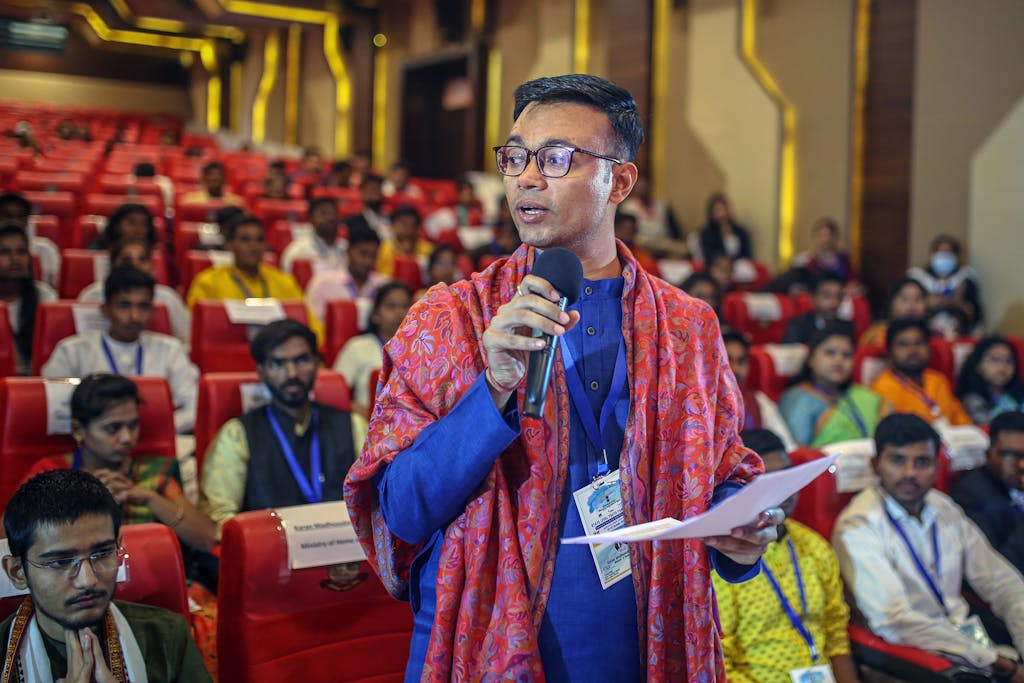
Activists enhance native factors and make recommendations to policymakers all by way of a state-diploma parliament session for youthful people supported by UNICEF in Mumbai, India. True inclusion inside the multilateral system means not simply inviting youthful people to the desk however listening to – and performing on – their recommendations. picture: Dhiraj Singh / UNICEF
What’s one key idea, reply, or innovation you suppose may pace up progress on the Sustainable enchancment goals?
Butti Almheiri, United Arab Emirates, 24 | Fellowship Focus: local climate
A majority of nations don’t have a baseline to measure implementation of the SDGs. this would possibly probably be a important drawback that I think about the UN may assist clear up by rising entry to expertise and digital platforms, particularly for people in distant and rural areas. fixing this drawback may probably be a gamechanger for the SDGs.
Saru Duckworth, Nepal-USA, 24 | Fellowship Focus: Jobs
youthful individuals are already main, growing, and delivering completely different packages for the SDGs, collectively with key factors like local climate change and human rights. Youth are on an everyday basis amongst the numerous first to acknowledge these factors, expertise them, and contextualize them of their very personal communities. That’s one factor that has been actually inspiring to see by way of Unlock the future’s Engine Room [a global virtual forum for young changemakers to connect, collaborate, and mobilize ahead of the SDG Summit in September 2023]. i want to see method extra of that in multilateral areas.
Jacob Ellis, Wales, 30 | Fellowship Focus: Future Generations
i want to see us have a good time the wins. The narrative throughout the SDGs may even be very a lot one in all failure. however all of us know that there are good issues to have a good time. There’s a Welsh proverb, or saying, that interprets to: “‘Do the small issues and do them joyfully. get pleasure from doing small actions. get pleasure from doing good deeds.’” particularly inside the sustainable enchancment discipline, we don’t completely revenue from the wins that we see earlier than us ample, or have a good time the actions that we’re taking collectively. And in case you suppose holistically regarding the SDGs, then i suppose you may discover even greater examples. In Wales, we’ve banned avenue funding — we don’t pay money for roads anymore. That helps the aim on sustainable cities (SDG11), however additionally goals that sort out air extreme quality (SDG3, 7, and eleven), well being (SDG3), and biodiversity (SDG15).
Mai Sami Mohamed Ahmed, Egypt, Age 28 | Fellowship Focus: little one Rights
Youth and kids should be included in further completely different UN key moments. for event, they want to be included … [in] complementary voluntary nationwide reporting, which Save the kids just at present created steering for. Youth and kids are primarily the most interesting ones to inform us whether or not the SDG implementation is making an affect or not. we ought to always have a youth-nice lens when drafting completely different insurance coverage policies and this may often be achieved by inviting youthful leaders from completely different international places.
Kelechi Achinonu, Nigeria, Age 28 | Fellowship Focus: Justice
Measure what works, know what works, and gives consideration to what works, however try this as quick as doable. If it’s not working, we drop it, or we pivot into one factor else, or we try and know why it isn’t working based mostly on information and go a distinct route barely than ready till the tip. I think about that by the function we try this, we’ll get to the place we want to get to [and] see the end result that we truly needed to see as a end result of we did the becoming issues.
Inés Yábar, Peru, 27 | subsequent expertise Fellows Lead
There isn’t one key idea, reply, or innovation that would pace up the implementation of the SDGs as a end result of it’s decrease than one particular person — it’s as a lot as all of us. we will all contribute to attaining the SDGs in our personal methods. What we actually want is extra dedication to the SDGs. as a end result of if we aren’t all dedicated, then we’re going to ship with much less ambition and maybe even cease alongside the most interesting method. there are so many issues we will all do to assist ship on the SDGs. We simply can’t stop.
MEET the subsequent expertise FELLOWS
Convened by the UN basis, the subsequent expertise Fellows program places youthful people globally on the forefront of the movement to make our multilateral system extra inclusive and conscious of the wants of future generations.
The Fellows additionally attended the ECOSOC Youth discussion board. observe their journey right here.

